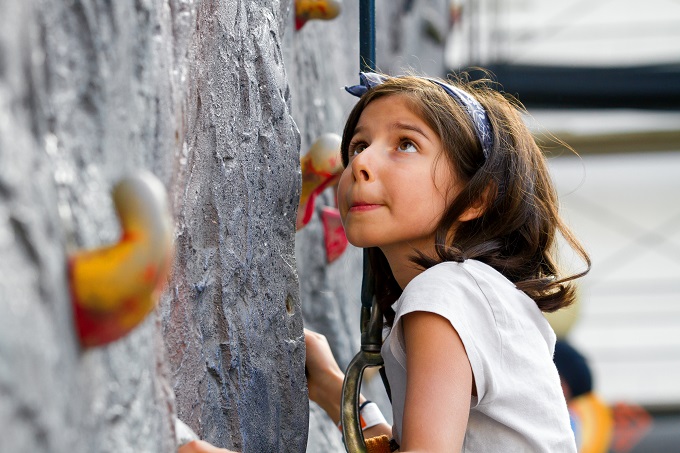
© jbrown - stock.adobe.com
<h4>Learning outside the classroom through adventurous activities is known to have <a href="https://www.taylorfrancis.com/books/e/9780203858134/chapters/10.4324%2F9780203858134-17" target="_blank">significant educational benefits</a>. It helps children develop technical, intellectual and social skills by overcoming challenges and sharing decisions.</h4>
<p>Such activities might include various <a href="http://blogs.brighton.ac.uk/sasm/2015/02/10/trainee-pe-teachers-run-orienteering-festival/" target="_blank">forms of orienteering</a>, using a climbing wall or different forms of cycling – as well as team building, trust games and problem-solving tasks.</p>
<p>From a psychological perspective, they help pupils develop a “can do” attitude that can be applied to all aspects of school life. They instil a sense of determination which gives them the confidence to face up to challenges, express and deal with emotions, and a desire to succeed.</p>
<p>Adventurous activities also help pupils to overcome fear, anxiety and physical stress. Quite often this means putting children outside of their comfort zones and exposing them to scenarios they are not used to. These may be situations they perceive as too difficult or potentially dangerous, but are all part of teaching them about risks and safety.</p>
<p>It is a physical education teachers’ role to plan and put into action situations that can provide maximum mental development but with minimum risk. In the UK, the <a href="https://www.gov.uk/government/publications/national-curriculum-in-england-physical-education-programmes-of-study" target="_blank">National Curriculum</a> for physical education requires teachers to provide opportunities for taking part in outdoor and adventurous pursuits.</p>
<p>The idea is to present pupils with intellectual and physical challenges which encourage them to work in a team, building trust and problem solving skills.</p>
<p>But there are <a href="http://blogs.brighton.ac.uk/sasm/2016/12/02/the-really-useful-pe-book/" target="_blank">academic benefits too</a>. This is a chance to promote cross-curricular teaching whereby pupils can improve their own learning and performance, improve their literacy, numeracy and communication skills – with applications for other core curriculum subjects such as mathematics, geography and science.</p>
<p>Alternatively, a focus on personal and social development using basic skills related to outdoor activities can be achieved through a number of trust games, team-building exercises and problem-solving activities which promote feelings of cooperation.</p>
<p>They also enhance pupils’ ability to work together and develop a sense of responsibility. Many of these are particularly suited to the beginning of the academic year for pupils making the transition from junior schools into secondary education, when confidence building is especially valuable.</p>
<p>Physical education teachers also need to be open to new kinds of exercise that children may enjoy at home, which can easily be transferred to increasing the appeal of PE at school – particularly for those children who seem to lack confidence.</p>
<h2>Balancing skills</h2>
<p>Young people are participating in very different physical activities outside of school compared to the types of sport taught as part of the formal PE curriculum, such as cricket or rugby. For example, many enjoy cycling in their free time, so providing the chance to incorporate this could make the subject more appealing to a broader section of pupils.</p>
<p>At the University of Brighton, trainee teachers have been introduced to this relatively new concept of “<a href="http://blogs.brighton.ac.uk/sasm/2016/02/12/pe-on-wheels/" target="_blank">physical education on wheels</a>”. The idea is to embrace the popularity of mountain biking, BMX biking, skateboarding, and scooting, which can all be viewed as adventurous forms of exercise. Yet few schools seem have recognised this as a means to increase pupils’ activity levels and tend to ignore the potential of introducing these activities into their PE lessons.</p>
<figure><iframe src="https://www.youtube.com/embed/gb9HnSr3cZE?wmode=transparent&;start=0" width="440" height="260" frameborder="0" allowfullscreen="allowfullscreen"></iframe></figure>
<p>It’s also worth stressing that adventurous activities are ideal for involving all pupils (including those with additional learning needs). Minimal adaptations are required, and young people can work cooperatively at a level appropriate to their needs.</p>
<p>Yet many children are unable to enjoy this kind of experience – often because of understandable concerns from their schools about cost, expertise, facilities and time. But an adventurous approach to PE should not be restricted to schools with access to neighbouring forests or mountain ranges.</p>
<p>Adventurous activities can all be taught on a school site and introduced in a safe and enjoyable way even in schools that have limited outdoor space where lessons can be adapted for playgrounds and school halls.</p>
<p>In this way, teachers can ensure that everyone does the same activity with minimal adaptations to the environment, and without the need for specialist equipment. All pupils can contribute to a shared group outcome – and benefit from an adventurous approach to their physical education.<!-- Below is The Conversation's page counter tag. Please DO NOT REMOVE. --><img style="border: none !important; box-shadow: none !important; margin: 0 !important; max-height: 1px !important; max-width: 1px !important; min-height: 1px !important; min-width: 1px !important; opacity: 0 !important; outline: none !important; padding: 0 !important; text-shadow: none !important;" src="https://counter.theconversation.com/content/128352/count.gif?distributor=republish-lightbox-basic" alt="The Conversation" width="1" height="1" /><!-- End of code. If you don't see any code above, please get new code from the Advanced tab after you click the republish button. The page counter does not collect any personal data. More info: http://theconversation.com/republishing-guidelines --></p>
<h6><a href="https://theconversation.com/profiles/gary-stidder-904426" target="_blank">Gary Stidder</a>, Principal Lecturer, School of Sport and Service Management, <em><a href="https://theconversation.com/institutions/university-of-brighton-942" target="_blank">University of Brighton. </a></em>This article is republished from <a href="http://theconversation.com" target="_blank">The Conversation</a> under a Creative Commons license. Read the <a href="https://theconversation.com/learning-through-adventure-the-many-skills-that-can-be-taught-outside-the-classroom-128352" target="_blank">original article</a>.</h6>

Industrial, legal action and unrest between the education sector and the Ministry of Education rises…
Tumuaki Billie-Jean Potaka Ayton shares her perspectives on leadership, and building a community around your…
As well as physical access to spaces, a culture of inclusivity means valuing and respecting…
School design changes with the education ideology changes of the eras, explain New Zealand and…
In this op-ed, Rebecca Thomas encourages educators to pause and rediscover their fire and passion…
Curriculum rewrites at the Ministry of Education are struggling with a lack of clarity, according…
This website uses cookies.